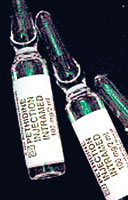Even as a stock of the essential painkiller pethidine was urgently air-lifted into the country last week to meet a dramatic shortfall, doctors were concerned whether it was adequate to meet the needs of the war casualties, aggravated by the fact that some hospitals also did not have the substitute pain-killer morphine.
While a health source assured that around 20,000 vials of pethidine were brought down on February 20 and February 27 from two sources in India and England, doctors asked whether they would be sufficient to be distributed to all hospitals with war casualties.
 |
| Pethidine: An essential painkillier in short supply |
However, a Heath Ministry source said that stocks were adequate until further stocks were imported to the country.
But, one source pointed out that wounded soldiers and civilians were brought from the warfront to hospitals such as the National Hospital, Kalubowila, Ragama, Sri Jayewardenepura, Homagama, Military Hospital, Anuradhapura, Polonnaruwa, Vavuniya, Mannar and Trincomalee.
A particular hospital in Colombo alone needed about 60-70 vials of pethidine a day amounting to about 2,000 a month. "After amputations and even for dressings and upper limb fractures the war casualties need a heavy painkiller like pethidine, the effects of which last for around 4-6 hours, or at least morphine," another source explained.
“We need to manage with mild painkillers like Tramadol or even Fentanyl, the effects of which wear off in about one hour. Fentanyl can also set off depression in the respiratory tract resulting in cardiac arrest,” said this source.
The shortage of pethidine arose after a large stock reached expiry and had to be discarded in early February, setting off an inquiry by the Auditor-General's Department.
Meanwhile, The Sunday Times understands, that hot on the heels of the pethidine fiasco comes a shortage of anti-retroviral (ARV) medication given to people living with HIV, due to procedural delays going as far back as last July. |

